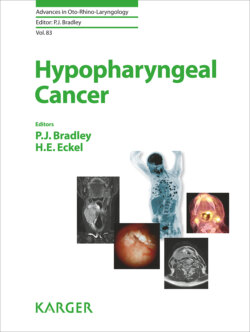Читать книгу Hypopharyngeal Cancer - Группа авторов - Страница 21
На сайте Литреса книга снята с продажи.
Diet
ОглавлениеDietary factors might contribute to a high risk of hypopharyngeal cancer development in India [64]. In addition to tobacco and alcohol, dietary deficiencies in vitamin A and B, as well as iron are implicated in the aetiology. A low fruit and vegetable diet has also been suggested to be a strong risk factor causing pharyngeal cancers [25].
Post-cricoid carcinoma has long been correlated with the Paterson, Brown-Kelly syndrome (UK; Plummer-Vinson syndrome (USA) or sideropenic dysphagia). The syndrome is characterised as small narrow mouth, angular chelitis (ulceration of the angles of the mouth), atrophic glossitis, and early loss of teeth, koilonychias and dysphagia associated with iron deficiency anaemia – all suggesting malabsorption or malnutrition. Most frequently diagnosed in women in the 4th to 7th decade, it is not that infrequently seen in men [65]. The risk of post-cricoid/oesophageal carcinoma in patients followed up for many years showed an increased frequency ranging from 4 to 16% in different series [66].
The association of sideropenic anaemia and hypopharyngeal cancer was almost endemic during the 1950s in men and women in Scotland and Wales [67]. The disease seems to have decreased rapidly in the developed world with improvement in nutrition and vitamins; this is not necessarily true in the developing world such as reported in India where “postcricoid carcinoma is by no means rare” (0.2/100,000 to 1/100,000) and is considered not to be associated with smoking cigarettes or alcohol ingestion [68]. Early treatment with iron supplements may reverse the symptoms and reduce the risk of developing a malignant tumour [60, 62].
